When someone speaks of "Japanese Poetry" the first word that comes to mind is "haiku." But there is much more to experience with poetry from and about Japan.
Poetry & Jazz, on Saturday night at 7:30 p.m. at the Gualala Arts Center Auditorium - the second weekend of the Whale & Jazz Festival - will not be just your mother's old poetry reading.
With cabaret seating and sushi and sake (included in the price of the ticket - $20 in advance, $5 more on the day of the performance, if available) and with art of, and about, Japanese culture as well as
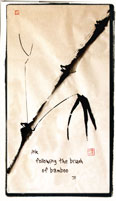 poetry by local artists on the walls,
the visitor is guaranteed an amazing event.
poetry by local artists on the walls,
the visitor is guaranteed an amazing event.
The evening starts off with a free verse poem (yes, it is popular in Japan, too) by our own
Blake More reciting the poem she wrote of her visit to Japan - "Notes from a Jazz Geisha, Tokyo."
Blake will be backed by the talented Shirley Muramoto, of Oakland - a classically trained koto (harp) player who loves to write and play jazz, also. Shirley will be accompanied by Karl Young, our well-known shakuhachi (bamboo flute) player.
Next this duo will perform the American pop standard written by Vince Guaraldi, "Cast your Fate to the Wind," arranged by Shirley Muramoto for koto and shakuhachi.
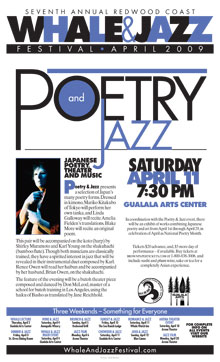
Poster by Hall Kelley
8½"x14"
 96 KB pdf 96 KB pdf
|
The event brings a very special international performance by Mariko Kitakubo from Tokyo, Japan. She will recite, in Japanese, selections of her tanka (a slightly longer poem form similar to haiku but much older) from her book, On This Same Star. Since the poems have been translated by Amelia Fielding, who recently won a prize for her work, Linda Galloway will read the poems in English as Mariko accompanies them on the hamohn - the "Lord Striking Thunder" drum.
Bringing the Japanese poetry back to America, Renée Owen of Sebastopol, a prize-winning author, will read selections of her haibun - (haiku combined with prose -
another four-hundred year old poetry form). Her reading will be given musical accompaniment by her husband, Brian Foster, who also plays the shakuhachi. The pair has given outstanding performances up and down the coast that greatly pleased their audiences.
During intermission, books and CDs by the evening's participants will be available for purchase from Joel and Jeremy Crockett from
Four-Eyed Frog Books.
More sushi and extra sake or tea will be available for purchase.
Opening the second half of the program will be a classical performance by Shirley Muramoto on the koto of a modern composition, "Shaei - Diagonal Shadows" by Hikaru Sawai.
Then she will be joined by Karl Young, on shakuhachi, for a traditional work titled "Yoshino Shizuka," which is a classical-style story song by Katsuko Chikushi. In it the tale is told of Lady Shizuka (she lived from 1165-1211), who is one of the most famous women in Japanese history and literature. She was a court dancer and the mistress of Minamoto no Yoshitsune - a military leader attempting unify the country. When Yoshitsune was forced to flee Kyoto in 1185, Lady Shizuka was left behind and was captured by forces loyal to Yoritomo - his foe. She was then forced to dance for the new shogun, where she sang songs with incredible bravery, of her longing for her lost lover Yoshitsune. This one, in the form of a tanka is:
where is my love?
cherry blossoms are falling on Yoshino mountain.
how were we drawn apart?
how unfortunate we are! with sadness,
I have come to Yobiko island.
You have surely read haiku and you may have even written some, but on this night, haiku will be danced. Don McLeod, the master of a butoh school of Los Angeles, will perform a selection of haiku by the Japanese Master Basho as translated by Jane Reichhold.
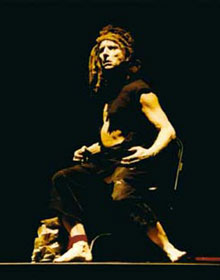 With austere and striking movements interspersed with periods of incredible stillness, this dancer brings the emotion of Basho's work directly into understanding. Butoh dance/theater only began in the late 1950s, but its roots go back to the most primitive and eerie "earth stomping" dances lost in the ages of history. To perform these physically demanding dances, the performer must train not only body, but also soul and mind.
With austere and striking movements interspersed with periods of incredible stillness, this dancer brings the emotion of Basho's work directly into understanding. Butoh dance/theater only began in the late 1950s, but its roots go back to the most primitive and eerie "earth stomping" dances lost in the ages of history. To perform these physically demanding dances, the performer must train not only body, but also soul and mind.
We have the rare great fortune of watching a butoh dancer who is also a published haiku poet.
Don McLeod grew up in Manchester and went to High School in Point Arena where he was student body president in 1966 before going on to Hollywood and his illustrious acting career (see below).
Do not miss this exciting combination of outstanding performances that will change the way you think about poetry, about Japan, and maybe about yourself.
Tickets are available online, by calling 1-800-838-3006 or in person at Gualala Arts Center or the Dolphin Gallery. Doors open at 7:00 p.m. Program begins at 7:30 p.m.
In coordination with the Poetry & Jazz event, there will be an
exhibit of works combining Japanese poetry and art
in the Coleman Auditorium from April 1st through April 29, in celebration of April as Poetry Month.
About the Artists
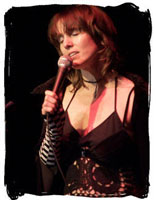 Blake More is a poet, teacher, visual artist, performance artist, local art entrepreneur and self-proclaimed dork. A visit to her website
"be more creations"
will illuminate many facets of this extraordinary, multi-faceted and talented woman.
Blake More is a poet, teacher, visual artist, performance artist, local art entrepreneur and self-proclaimed dork. A visit to her website
"be more creations"
will illuminate many facets of this extraordinary, multi-faceted and talented woman.
At the
2005 Whale & Jazz Festival Main Event
Blake wowed the crowd with her poetic tribute to John Coltrane accompanied by Steve Heckman on tenor sax.
Blake works extensively in the South Coast Area as a California Poet in the Schools (CPITS), Poet Teacher at Point Arena Elementary and High School, Pacific Charter and Horicon School. She also coaches the Point Arena High School Poetry Slam team.
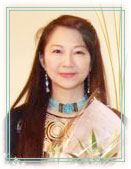 Mariko Kitakubo is a young woman living in Tokyo who has published several books of tanka - the oldest poetry form in the world that is still actively written. Her books Cicada Forest and On This Same Star have been translated into English by award-winning Australian translator, Amelia Fielden. Mariko has performed in the prestigious Toto-kai Horinouchi Noh Theater, Tokyo and been on tour to festivals and poetry gatherings on the West Coast.
Mariko Kitakubo is a young woman living in Tokyo who has published several books of tanka - the oldest poetry form in the world that is still actively written. Her books Cicada Forest and On This Same Star have been translated into English by award-winning Australian translator, Amelia Fielden. Mariko has performed in the prestigious Toto-kai Horinouchi Noh Theater, Tokyo and been on tour to festivals and poetry gatherings on the West Coast.
Shirley Kazuyo Muramoto, a native of Oakland, California, continues a long tradition of Japanese koto music in America. This tradition began when her mother was encouraged to learn the koto as a young girl in the American relocation camps of World War II.
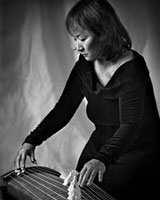 Given a koto with no strings, Muramoto's grandfather, Yasuki Hori, fashioned strings by tying reeds together. He made ji (tuning bridges) by carving wood scraps and toothbrush handles. Yasuki learned the shakuhachi (bamboo flute) to play songs with his two daughters and encouraged their practicing.
Given a koto with no strings, Muramoto's grandfather, Yasuki Hori, fashioned strings by tying reeds together. He made ji (tuning bridges) by carving wood scraps and toothbrush handles. Yasuki learned the shakuhachi (bamboo flute) to play songs with his two daughters and encouraged their practicing.
From childhood, Muramoto was fortunate to receive training on various styles of koto music from such masters as Kazue Kudo, Tomoko Sunazaki, Yoko Gates and from her mother, Madame Kazuko Muramoto.
In 1976, Muramoto received her Shihan degree (Instructor's license) with Yushusho (highest ranking honors) at the Chikushi School in Fukuoka, Japan.
Her ability to perform on the koto from traditional to contemporary to jazz gives her the distinction of being one of the few koto musicians to be able to perform in a variety of styles.
She has performed at various universities, concerts and events in the U.S., Canada and Japan, including performances with cinematic composer Maurice Jarre, the Sacramento Symphony, the Marin Symphony and with shakuhachi master John Kaizan Neptune.
Muramoto has performed for dignitaries such as San Francisco Mayor Willie Brown, former Secretary of State George Schultz, Vice President Al Gore and Mikhael Gorbachev.
As director of the Murasaki Ensemble, Muramoto's objective is to express creative collaborations with other artists and with the Ensemble in expression of the "World Beat."
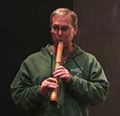
Karl Young, who divides his time between living here on the coast and in San Francisco, is well-known for his performances and lectures on the shakuhachi at Gualala Arts. He works and performs with groups of musicians on taiko drums, koto, shamisan and other flutes. He has studied with shakuhachi masters in Japan and in the States.
Renee Owen and her husband Brian Owen have done a series of readings at poetry gatherings at events along the coast. Renee first studied haiku but has now expanded her interest into haibun - a Japanese poetry form that combines prose writing with haiku. It is this style used by the master Basho in his most famous book, Oku no Hosomichi - Back Roads to the Far North.
Basho-inspired Butoh
arranged and performed by Don McLeod
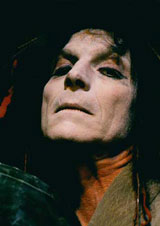 Don McLeod was born in Edmonton, Alberta, Canada. He grew up as an only child on a small rural farm near Mendocino, in Northern California. He studied movement and theatre at Pasadena Playhouse, School of Performing Arts San Diego, and the Banff School of Fine Arts in Canada.
Don McLeod was born in Edmonton, Alberta, Canada. He grew up as an only child on a small rural farm near Mendocino, in Northern California. He studied movement and theatre at Pasadena Playhouse, School of Performing Arts San Diego, and the Banff School of Fine Arts in Canada.
McLeod's dynamic style of physical theatre and dance was developed by his training with a number of the world's leading artists including Marcel Marceau, Etienne Decroux, Jerzy Grotowski and Sankai Juku.
Don's interest in butoh began during his many trips to Japan, which began in the late '70s. His butoh style has developed after many years studying the techniques of Japan's leading butoh artists including Kazuo Ohno, Yoko Ashikawa, Akaji Maro and most recently with Yukio Waguri, who passed on the "secret" teachings of Tatsumi Hijikata and his Butoh Fu techniques. His physical theatre career began when he studied with Marcel Marceau in the early '70s.
McLeod went on to form his own professional company and also began appearing in films, television and solo concerts throughout the U.S. In 1974 he was selected as a resident performing artist at the World's Fair in Washington, and then was picked to be a featured part of singer Diana Ross's World Tour. He has performed for President Jimmy Carter, appeared with Ms. Ross on Broadway, and toured his solo show in Japan since 1983. He has lived and performed extensively in Argentina, South Africa, Japan and Canada.
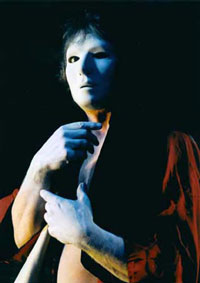 As a movement artist and actor, McLeod has appeared in many feature films, television shows and commercials. His film roles include the bizarre lead werewolf in The Howling, the over-sexed gorilla in Trading Places, and a physicist/gorilla in The Man With Two Brains. He doubled for Jack Nicholson in the Devil transformation scenes from Witches of Eastwick, played Peter Pan's Shadow in Hook, a gorilla in Born To Be Wild, Quasimodo in Naked Gun 2½ and a starring role (as a female gorilla) in Mom Can I Keep Her. Don was recently featured on the TV Series, Sheena - Queen of the Jungle.
As a movement artist and actor, McLeod has appeared in many feature films, television shows and commercials. His film roles include the bizarre lead werewolf in The Howling, the over-sexed gorilla in Trading Places, and a physicist/gorilla in The Man With Two Brains. He doubled for Jack Nicholson in the Devil transformation scenes from Witches of Eastwick, played Peter Pan's Shadow in Hook, a gorilla in Born To Be Wild, Quasimodo in Naked Gun 2½ and a starring role (as a female gorilla) in Mom Can I Keep Her. Don was recently featured on the TV Series, Sheena - Queen of the Jungle.
He has also appeared on many other TV shows including Speilberg's Amazing Stories, where he co-starred with Hayley Mills. Many will remember Don as the suitcase-smashing gorilla on the award-winning American Tourister Luggage ads on TV. He was recently seen as the Grim Reaper in the new TIVO commercial, and as a "sexy" orangutan for MasterCard. He also was a regular on the popular TV series Tarzan: The Epic Adventures, where he was featured as Tarzan's gorilla buddy Bolgani. In addition he played all the creatures and monsters on the show.
Don has toured numerous colleges, theatres and high schools in the U.S. and Canada. He frequently tours to Asia and South America, and he is also a part-time faculty member at The American Academy of Dramatic Arts in Los Angeles, where he teaches an intensive butoh workshop. McLeod is also a widely published poet and fiction writer, and the co-editor of the literary journal Vol. No. Magazine.
Don will be performing his own composition based the haiku of Basho as translated by Jane Reichhold.
The Gualala Arts Center, located at 46501 Old State Highway in Gualala, CA,
is open weekdays 9:00 a.m. to 4:00 p.m., and weekends from noon to 4:00 p.m.
Please call (707) 884-1138 for more information, or email
info@gualalaarts.org.
Serving the coastal communities of northern Sonoma & southern Mendocino Counties.

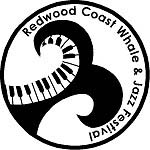
 poetry by local artists on the walls
poetry by local artists on the walls
 With austere and striking movements interspersed with periods of incredible stillness, this dancer brings the emotion of Basho's work directly into understanding. Butoh dance/theater only began in the late 1950s, but its roots go back to the most primitive and eerie "earth stomping" dances lost in the ages of history. To perform these physically demanding dances, the performer must train not only body, but also soul and mind.
With austere and striking movements interspersed with periods of incredible stillness, this dancer brings the emotion of Basho's work directly into understanding. Butoh dance/theater only began in the late 1950s, but its roots go back to the most primitive and eerie "earth stomping" dances lost in the ages of history. To perform these physically demanding dances, the performer must train not only body, but also soul and mind.
 Blake More is a poet, teacher, visual artist, performance artist, local art entrepreneur and self-proclaimed dork. A visit to her website
Blake More is a poet, teacher, visual artist, performance artist, local art entrepreneur and self-proclaimed dork. A visit to her website
 Mariko Kitakubo is a young woman living in Tokyo who has published several books of tanka - the oldest poetry form in the world that is still actively written. Her books Cicada Forest and On This Same Star have been translated into English by award-winning Australian translator, Amelia Fielden. Mariko has performed in the prestigious Toto-kai Horinouchi Noh Theater, Tokyo and been on tour to festivals and poetry gatherings on the West Coast.
Mariko Kitakubo is a young woman living in Tokyo who has published several books of tanka - the oldest poetry form in the world that is still actively written. Her books Cicada Forest and On This Same Star have been translated into English by award-winning Australian translator, Amelia Fielden. Mariko has performed in the prestigious Toto-kai Horinouchi Noh Theater, Tokyo and been on tour to festivals and poetry gatherings on the West Coast.
 Given a koto with no strings, Muramoto's grandfather, Yasuki Hori, fashioned strings by tying reeds together. He made ji (tuning bridges) by carving wood scraps and toothbrush handles. Yasuki learned the shakuhachi (bamboo flute) to play songs with his two daughters and encouraged their practicing.
Given a koto with no strings, Muramoto's grandfather, Yasuki Hori, fashioned strings by tying reeds together. He made ji (tuning bridges) by carving wood scraps and toothbrush handles. Yasuki learned the shakuhachi (bamboo flute) to play songs with his two daughters and encouraged their practicing.

 Don McLeod was born in Edmonton, Alberta, Canada. He grew up as an only child on a small rural farm near Mendocino, in Northern California. He studied movement and theatre at Pasadena Playhouse, School of Performing Arts San Diego, and the Banff School of Fine Arts in Canada.
Don McLeod was born in Edmonton, Alberta, Canada. He grew up as an only child on a small rural farm near Mendocino, in Northern California. He studied movement and theatre at Pasadena Playhouse, School of Performing Arts San Diego, and the Banff School of Fine Arts in Canada.
 As a movement artist and actor, McLeod has appeared in many feature films, television shows and commercials. His film roles include the bizarre lead werewolf in The Howling, the over-sexed gorilla in Trading Places, and a physicist/gorilla in The Man With Two Brains. He doubled for Jack Nicholson in the Devil transformation scenes from Witches of Eastwick, played Peter Pan's Shadow in Hook, a gorilla in Born To Be Wild, Quasimodo in Naked Gun 2½ and a starring role (as a female gorilla) in Mom Can I Keep Her. Don was recently featured on the TV Series, Sheena - Queen of the Jungle.
As a movement artist and actor, McLeod has appeared in many feature films, television shows and commercials. His film roles include the bizarre lead werewolf in The Howling, the over-sexed gorilla in Trading Places, and a physicist/gorilla in The Man With Two Brains. He doubled for Jack Nicholson in the Devil transformation scenes from Witches of Eastwick, played Peter Pan's Shadow in Hook, a gorilla in Born To Be Wild, Quasimodo in Naked Gun 2½ and a starring role (as a female gorilla) in Mom Can I Keep Her. Don was recently featured on the TV Series, Sheena - Queen of the Jungle.